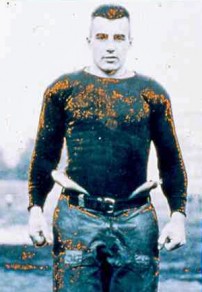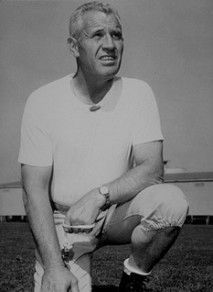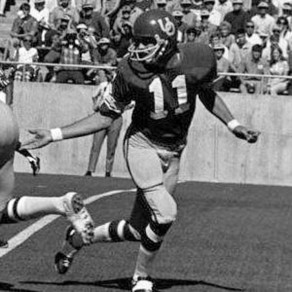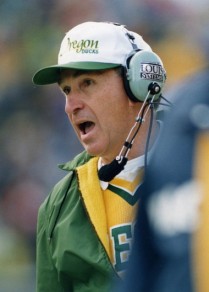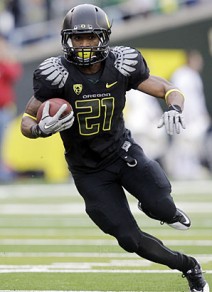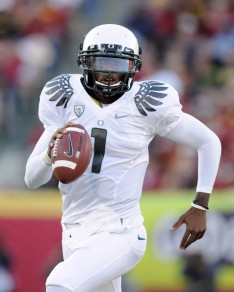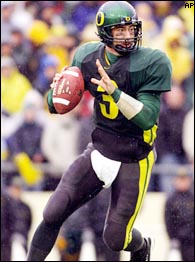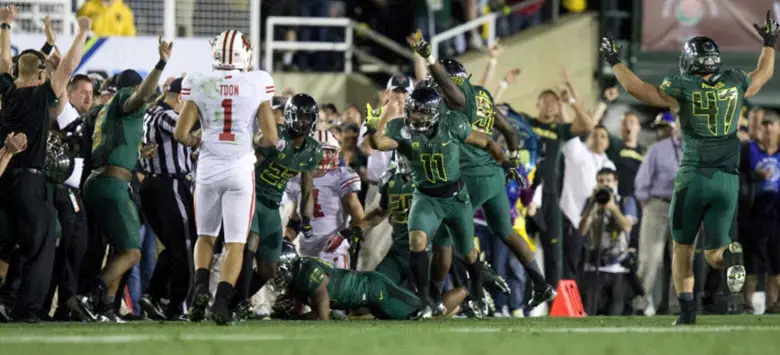
Ducks recover fumble!
The University of Oregon football program has reached unprecedented levels of success in recent years. Head coach Chip Kelly has taken the Ducks to three straight BCS bowls, including a national championship game appearance in 2011, a feat no other team in the country has accomplished, all while keeping his coaching staff completely intact—again, unrivaled by any team in the nation.
It is easy to forget that Oregon’s football team has not always been elite. In fact, over the last century, the Ducks have seen as many struggles as they have waves of victory and triumph. The 1983 Civil War game, for example, was deemed the ‘Toilet Bowl,’ the last scoreless tie in NCAA history, played between the conference’s two worst teams. To put it in another perspective, in the last three years alone Oregon has won more games than during the entire 1970s.
When looking back at the roller coaster ride that is Oregon football’s history, it is important to recall those games that changed the program. Some games propelled the Ducks into new eras of greatness; some brought them out of long-lasting slumps, others proved that Oregon could beat even the country’s best teams on the national stage.
Here is a look at ten of the most important games in the program’s history, each truly changing the course of Oregon football.
1917 East-West Tournament Game
Oregon 14, Pennsylvania 0
Oregon made a statement during their first year in the Pacific Coast Conference in 1916. Except for a scoreless tie against Washington, Hugo Bezdek’s Ducks won every game, including a 97-0 victory over Willamette. This outstanding regular season led to Oregon’s first trip to the East-West Tournament game, later renamed the Rose Bowl.
The game was held at Tournament Park (the Rose Bowl wasn’t built until 1921). Despite their excellent record, Oregon still entered the game as an underdog to a Pennsylvania team with three all-Americans. Even back then east coast bias permeated as it was thought that no west coast team could contend with the might of then east coast powerhouse Pennsylvania.
However, the Ducks silenced the Penn Quakers, winning 14-0 in the team’s fifth straight shutout victory. Shy Huntington, Oregon’s first all-American, put on an outstanding individual performance, as he intercepted four passes, threw a touchdown, and ran for another. Yet in spite of that impressive showing, it would be offensive lineman John Beckett who would earn game MVP honors for his stellar play.
In only the third East-West Tournament (Rose Bowl) game ever played, the Ducks proved that western teams could evenly compete with the nation’s previously dominant eastern teams. This game also showed that Oregon was a force to be reckoned with in the PCC, and was the Ducks’ lone Rose Bowl victory until 2012.
Considering that this was the only bowl game in existence at the time, deemed a battle between the best teams from the east and west, it could easily be argued that by winning the East-West Tournament game Oregon actually won the national championship.
1958 Rose Bowl; Ohio State 10, Oregon 7
Led by quarterback Jack Crabtree and running backs Jim Shanley and Willie West, the Oregon Ducks capped off the 1957 season with their first trip to the Rose Bowl since 1919.
Head coach Len Casanova and the Ducks took on Woody Hayes’ No. 1 Ohio State Buckeyes on January 1, 1958. Oregon ended up losing 10-7 in a battle for the ages, but the Ducks outgained the Buckeyes in total yards, Jack Crabtree earning player-of-the-game honors, one of the few game MVPs from the losing side (along with Oregon quarterback Danny O’Neil, the MVP of the 1995 game).
“There is no way anyone connected with it can forget the Rose Bowl game,” said assistant coach Jerry Frei. “It was out of this world and unbelievable how we played.”
Three long drives late in the game resulted in no points for the Ducks. The loss was heartbreaking, the battle hard-fought, and the 1957 Oregon team remains one of the school’s best of all-time. The media took notice too, as prior to the game it was often written that it would be the biggest blowout in Rose Bowl history, the little Oregon Ducks completely outmatched against the eventual national champion OSU, but the Ducks largely outplayed Ohio State, garnering great praise in the press coverage of the game.
This game was big for the program because up until this point, the Ducks had only seen one bowl game since 1919. Just like 41 years prior, Oregon had proven they belonged, even in defeat, against an elite east coast team. Fittingly, at the end of the game Oregon’s players carried Coach Len Casanova off the field on their shoulders in triumph, despite the losing score.
1970 Oregon 41, UCLA 40
1970 was the Ducks’ first winning season in six years, the program experiencing some down years since the highs of the 1963 season, which featured two future NFL Hall of Famers in Dave Wilcox and Mel Renfro and culminated in a Sun Bowl victory over SMU. Sophomore quarterback Dan Fouts, who emerged as a star after an injury to Tom Blanchard, was joined by running back Bobby Moore (now Ahmad Rashad) and wide receiver Bob Newland to form a lethal Oregon offense.
After a 2-1 start, the Ducks traveled to Los Angeles to take on UCLA at the Coliseum (UCLA didn’t begin playing their regular season games at the Rose Bowl until the 1980s). The Bruins had a significant 40-21 lead over Oregon in the fourth quarter, the game seemingly over until the Ducks launched what may be the greatest comeback in program history.
Bobby Moore punched in two quick late touchdowns to make the game 40-35, and the Ducks proceeded to recover an onside kick. Although Fouts had been knocked unconscious earlier in the game, he came back in and threw a touchdown pass to tight end Greg Specht to win the game 41-40.
This game was one of the biggest wins in the Ducks’ first successful season since 1963. While the 1970 season was both immediately preceded and followed by struggles, superstars like Fouts and Moore proved in this game that Oregon was a threat to beat any team at any time.
Independence Bowl 1989; Oregon 27, Tulsa 24
Head coach Rich Brooks took over in 1977 after his two predecessors, Dick Enright and Don Read, had combined for a record of 15-40 over five seasons. Brooks saw early success, recording six-win seasons in both 1979 and 1980 thanks in large part to the addition of JC transfer dual-threat quarterback Reggie Ogburn, but struggles in the following years showed that the Ducks needed some time to rebuild.
It wasn’t until 1989 that the rebuilding efforts came to fruition. Behind Brooks, Oregon’s all-time leading passer Bill Musgrave led the Ducks to a 7-4 regular season, earning an invite to the Independence Bowl to play Tulsa.
Trailing 24-10 through three quarters, the Oregon defense kept the game close. Chris Oldham intercepted two passes, and linebacker Mark Kearns tallied 11 tackles. Eventually, Musgrave and the Duck offense came alive, scoring 17 points in the game’s final 18 minutes.
The 1989 Independence Bowl marked the Ducks’ first bowl berth in 26 years launching Oregon into an era of unprecedented and consistent success. After the struggles of Enright and Read during the 1970s and more than 10 years of mediocrity during Brooks’ rebuilding process, the Ducks finally climbed out of the cellar with this victory. Since 1989, the Ducks have received 18 post-season invitations in 22 seasons.
1994 Oregon 31, Washington 20
After the 1958 Rose Bowl, the Ducks went through a 37-year stretch without a trip to Pasadena. Decades of mediocrity and disappointment were forgotten in 1994 when Rich Brooks’ Oregon team defeated the Washington Huskies 31-20 in Eugene in a manner that was perfectly described as ‘the most improbable finish to a football game.’
With less than two minutes to play in the game, the Ducks had a 24-20 lead following a 99-yard drive, but the Huskies were inside Oregon’s 10-yard line, ready to once more nonchalantly break Oregon’s hearts. That is until Washington quarterback Damon Huard was picked off at the 3-yard line by cornerback Kenny Wheaton, a redshirt freshman who had seen in extensive film study Washington’s tendency to throw out-patterns near the goal line. Wheaton took the ball 97 yards the other way for a touchdown, the littlest guy on the field making the biggest play in Oregon history.
Better known as ‘the pick’ or ‘the play that changed Oregon football,’ Wheaton’s interception sealed the victory and slingshot the Ducks to the Pac-10 title and Rose Bowl to face undefeated Penn State. Radio announcer Jerry Allen’s screaming declaration “Kenny Wheaton’s gonna score!” echoes throughout Autzen Stadium to this day before the team takes the field, a watershed moment in Oregon sports history embedded into the memories of all Duck fans, even those too young to have actually witnessed it first-hand.
Though the Ducks lost the 1995 Rose Bowl to Penn State, it brought them out of a lingering dry spell into a consistent pattern of winning. Since 1995, the Ducks have had only one losing season, their turning point traced back to this iconic moment against Washington.
2002 Fiesta Bowl; Oregon 38, Colorado 16
Led by Heisman Trophy candidate Joey Harrington, the 2001 Ducks started the season at No. 7 in the national polls. Oregon lost only to the Stanford Cardinal on their way to a No. 2 ranking and a Fiesta Bowl berth by the end of the regular season.
The Ducks took on the No. 3 ranked Colorado Buffaloes on January 1, 2002. Frustrated that Nebraska had received the nod to take on the undefeated Miami Hurricanes for the national title despite finishing third in the Big-12 and behind both Oregon and Colorado in the human polls, Oregon took out their pent-up fury on Colorado, dominating the Buffaloes 38-16.
An offense complete with Harrington, stud backs Onterrio Smith and Maurice Morris, and dynamic receivers Keenan Howry and Samie Parker; the Ducks had their way with the Colorado defense. One of the game’s biggest highlights was Morris’ 49-yard touchdown run, where he appeared down at the 21-yard line, but had actually rolled cleanly over a defender’s back to stay up and score.
Most impressive on the day though was Oregon’s defense, which completely stymied the potent Colorado running game, hyped as the most unstoppable ground attack in the country after steamrolling over Nebraska and Texas. Completely incapable of moving the chains against Oregon’s front seven, the team that had been hyped as ‘unstoppable’ and ‘the hottest team in the country’ eventually benched their quarterback and were forced into throwing every down to catch up with Oregon, those efforts proving futile.
Never before had the Ducks dominated on such a big stage, and Mike Bellotti’s 2001 squad proved that Oregon was one of the nation’s best programs with this Fiesta Bowl win, argued by many to have deserved a share of the national title, had Nebraska beaten Miami in the Rose Bowl. Nebraska’s stumble in the championship vs. Miami though gave the Hurricanes sole possession of the national title, fans and players left only to ponder how the outcome might have gone if Oregon had been given their shot.
2007 Oregon 39, Michigan 7
Opening the 2007 season at home, Oregon looked as if it wasn’t firing on all cylinders vs. Houston while adjusting to the new offense installed by brand new offensive coordinator Chip Kelly. By week 2 the kinks had been worked out, showcasing the full potential of the new scheme on a national stage. Running backs Jonathan Stewart and Jeremiah Johnson joined dynamic quarterback Dennis Dixon in the backfield to form one of the best offenses Oregon has ever seen.
The Ducks traveled to Ann Arbor, Michigan to take on the Wolverines at the Big House. Coming into the game the Ducks were thought to be cannon-fodder for a vengeful Michigan team, originally considered a national title contender but embarrassed by their opening season home loss to Appalachian State. However, in only his second game as Oregon’s offensive coordinator, Chip Kelly picked apart Michigan’s defense, giving Duck fans a glimpse of the up tempo, creative spread attack that has dominated the Pac-12 ever since.
Dixon led the way, racking up 368 yards of total offense and four touchdowns. His fake ‘statue-of-liberty’ play in the second quarter was the highlight of the day, as Jonathan Stewart sold the carry to the left and Dixon practically walked into the end zone from 10 yards out. Replayed all year, it became the iconic moment from the 2007 season, the highlight that likely would have propelled Dixon to the Heisman Trophy, had he not torn his ACL late in the year, missing the final few games.
Chip Kelly’s offense made it look easy all day, putting up 624 total yards. This 39-7 win put Oregon among the nation’s elite, and was a preview of Kelly’s creative, explosive, and dominant offense that the Pac-12 knows so well today. Following the Michigan win, Oregon suddenly was the talk of the nation, racing up the polls in line for possibly contending for the national championship, reaching as high as No. 2 before Dixon’s injury.
2009 Oregon 47, USC 20
After a 42-3 shellacking of a sixth-ranked Cal team a month earlier, Oregon proved that they were truly the new kings of the Pac-10 on Halloween night 2009. The No. 10 Ducks dominated the No. 5 USC Trojans with a performance that was fittingly deemed ‘scary good.’
When asked if he was worried about the noise in Autzen Stadium prior to the game, USC’s true freshman quarterback Matt Barkley fired Duck fans up by responding, “It won’t matter… I feed off the energy, I feed off that noise. I love it.”
If the noise didn’t get to him, the Ducks’ defense sure did. Barkley was sacked twice, threw an interception, and was held to only 187 yards through the air. On the other side of the ball, freshman running back LaMichael James put on a clinic, racking up 183 yards on the ground.
With two minutes to go in the first half, the game was tied at 17. From that point on, the Ducks outscored the Trojans 30-3. Throughout the second half, quarterback Jeremiah Masoli’s masterful abilities in the zone-read scheme made USC’s defense look silly. On that night, Oregon could do anything they wanted to the once mighty Trojans. Running back Kenjon Barner’s touchdown as the third quarter expired essentially put the game out of reach.
With this victory the Ducks proved themselves as a national power and ended USC’s streak of seven straight Pac-10 titles, emerging as the conference’s new team to beat. The victory was the largest defeat USC had ever suffered in its proud history to that date, a national audience witnessing the carnage amidst a rabid Autzen crowd hyped up from the ESPN College Gameday broadcast live from the stadium that morning.
The following week Stanford beat the Trojans even worse, signaling the end of the Pete Carroll era of total domination at USC. Oregon has won the Pac-10/12 title every year since.
2011 National Championship Game; Auburn 22, Oregon 19
The best season in Oregon football history culminated in the school’s first appearance in the BCS national championship game. After a perfect 12-0 regular season, the Ducks took on the Auburn Tigers in Glendale, Arizona for all the Tostitos.
While the 2010 regular season was filled with dominant offensive production in Chip Kelly’s hurry-up spread scheme, Auburn’s defense was ready, holding the Ducks to 75 yards on the ground.
Despite the result, the Ducks played well. Quarterback Darron Thomas threw for 363 yards, the second highest passing yardage total ever in a national championship game. The Oregon defense contained Heisman Trophy winner Cam Newton and his Auburn offense, forcing him to fumble, throw an interception, and sacking him twice.
Oregon had its chances, but were stopped on 4th and goal and also gave up a safety. Auburn, meanwhile, benefitted from some questionable calls, including a fumble by Newton that would have been returned for a touchdown by the Ducks had the refs not blown the play dead, an interception overturned where Auburn scored on the next play, and the now infamous Michael Dyer run with the play not being blown dead despite his wrist shown as being down on the replay, setting up the Tigers’ game-winning field goal.
While they lost the game, the Ducks proved that they could compete with the nation’s very best. The national championship game was the most memorable matchup from the school’s greatest season in history, and cemented the Ducks in the nation’s top tier of football programs.
2012 Rose Bowl; Oregon 45, Wisconsin 38
Oregon’s latest win was one of the school’s most memorable and significant. In a thrilling shootout between two great offenses, the Ducks held on to a late lead to beat the Wisconsin Badgers, their first Rose Bowl victory since 1917.
True freshman DeAnthony Thomas was the star of the show, with two touchdown runs over 60 yards, only touching the ball three times total during the game. His 91-yard sprint on a handoff up the middle as time expired in the first quarter was the longest run in Rose Bowl history. In his last career game, running back LaMichael James rushed for 159 yards and a touchdown to cap off his record-setting three-year tenure at Oregon.
The Ducks’ defense made some big plays in the second half, as Kiko Alonso’s interception and Michael Clay’s fumble recovery halted two threatening Wisconsin drives late in the game. Still it came down to the final seconds, Wisconsin failing to spike the ball in time to stop the clock before one last shot at the end zone.
This game was significant for a couple of reasons. First, it established Chip Kelly’s Ducks as one of the most consistently elite programs in recent history, as Oregon is the only team to make it to three BCS bowls in each of the last three seasons. It was also Oregon’s first Rose Bowl victory in 95 years, solidifying their current Pac-12 crown.
Honorable Mention
While these ten games were likely the most significant in the program’s history, they were certainly not the only ones that changed Oregon football in some way.
Games early on in the 1920s, for example, expanded the audience that could see and hear the Ducks play live. In 1920, the Ducks played the Civil War game in front of the first recorded crowd to exceed 10,000 spectators. In 1921, Oregon was invited to play in the Hawaiian Islands against the University of Hawaii and a Pearl Harbor military team. The Ducks won big over both teams, the game against Hawaii being one of the first live radio broadcasts in sports history. These games showed the growing excitement surrounding college football, and allowed more people to watch and listen to the Webfoots (as they were known back then) play live.
In 1963, former Oregon stars Bob Berry, Mel Renfro, and Dave Wilcox led the Ducks to an 8-3 record and a 21-14 Sun Bowl victory over SMU, their first bowl win since 1917. The game that really got the team going that year was a dominating 35-0 win over a vaunted West Virginia team in a very hostile Morgantown environment, as only heartbreaking losses to Washington and San Jose State with Berry and Renfro both injured kept the Ducks from winning out after defeating the Mountaineers.
In 1990, the Ducks shocked the nation with a victory over quarterback Ty Detmer, the eventual Heisman Trophy winner, and No. 4 BYU. Led by Bill Musgrave, Oregon avenged their 1989 loss to the Cougars with a convincing 32-16 win, and the Ducks finished the season with a very impressive 8-3 record and invite to the Freedom Bowl.
Two nail-biting victories over conference foes USC and Arizona State in 1999 and 2000 respectively kept Oregon in the conversation of the nation’s best teams. A 33-30 triple-overtime win over the Trojans was one of the team’s biggest wins on their way to an 8-3 record and a Sun Bowl berth in 1999. In 2000, Joey Harrington showed why his nickname was ‘Captain Comeback’ by defeating Arizona State 56-55 in double-overtime for a big road victory.
And then there’s the 2000 Holiday Bowl. After a loss to Oregon State in the final game of the regular season (the first Civil War with both teams ranked in the top 10), preventing Oregon from winning the Pac-10 conference title and a likely Rose Bowl victory vs. Purdue, the 9-2 Ducks took on the Texas Longhorns in San Diego. Oregon was down at halftime, but Joey Harrington brought the Ducks back to win 35-30. This bowl win gave the program its first 10-win season and its first season-ending top-10 ranking in history.
The Oregon football program has a rich history full of both victory and defeat, triumph and heartbreak. Looking back over that inconsistent past, it is easy to see how these ten games shifted the momentum of Ducks football.
Trips to the 1989 Independence Bowl and the 1958 Rose Bowl brought the Ducks out of decades of mediocrity and frustration. Wins over Washington in 1994 and USC in 2009 slingshot the Ducks into eras of unprecedented and consistent success. The 2011 national championship game and the 2012 Rose Bowl proved Oregon’s talent on the national stage against the country’s best.
These ten games are so important in Oregon football’s history because they truly changed the program. Each era of success in the program’s past is either marked by or can be traced back to one of these games.
With the recent success the Ducks have been having, it is not unreasonable to think that soon we may be seeing a game that would top all ten of these in significance: a national championship victory.
Related Articles:
Joey Holland graduated from the University of Oregon in 2013, majoring in History. He played several sports in high school, though football remains his passion. He has yet to miss a single Oregon Ducks home football game during his time in Eugene. Joey has written previously for Bleacher Report and Football Nation.
Joey welcomes your feedback.

